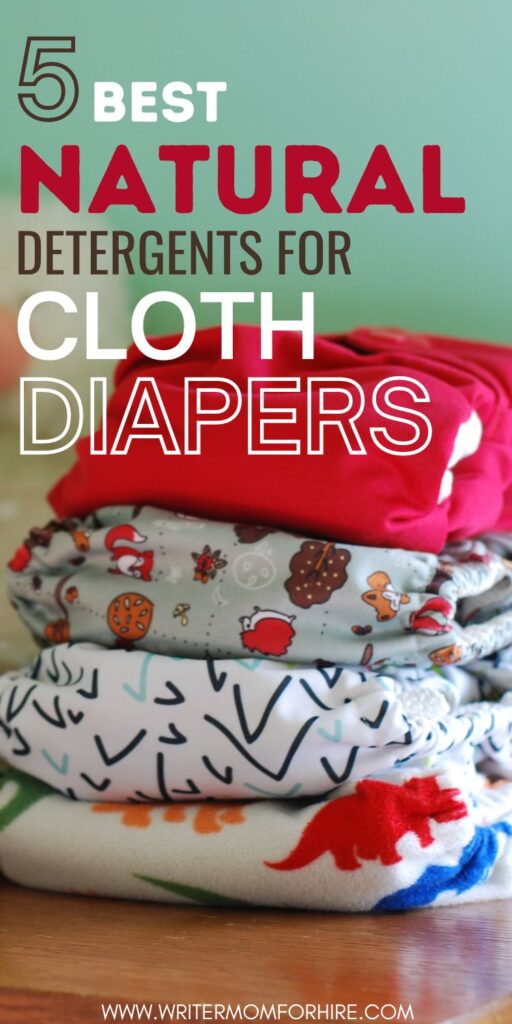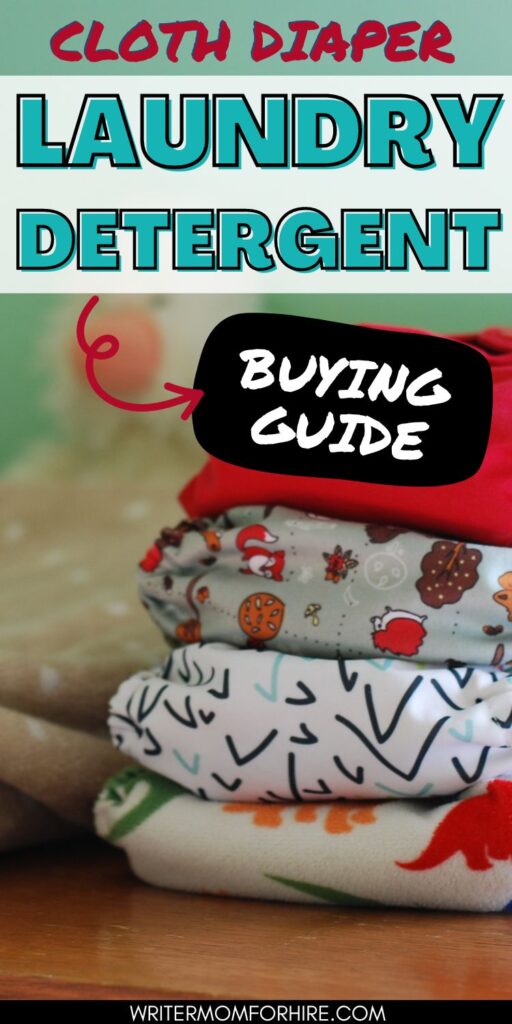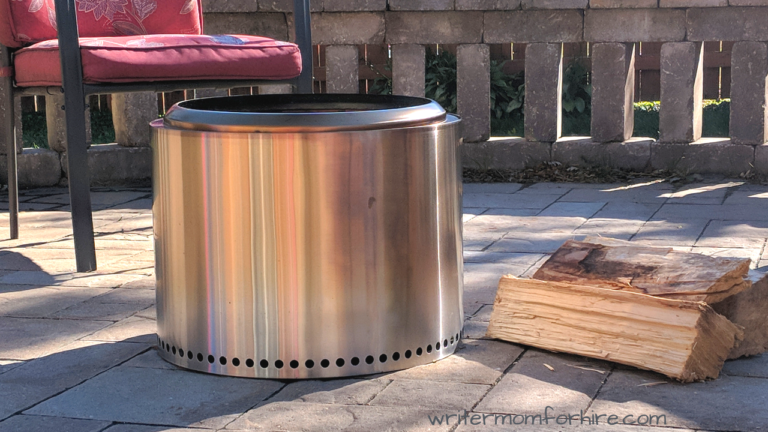The Best Natural Laundry Detergent for Cloth Diapers
This post may contain affiliate links and we may earn commissions when you make a purchase through these links (at no extra cost to you). See our disclosure policy for more details.
Non-Toxic Cloth Diaper Detergent: What to Look for & What to Avoid
What kind of laundry detergent is safe for cloth diapers? And, more importantly, what kind is safest for your baby’s delicate skin?
I get it. We used cloth diapers on our firstborn seven years ago, so I had the same questions back then.
Choosing the best natural laundry detergent for cloth diapers can feel overwhelming. (Especially if you’re just starting your cloth journey!)
But it shouldn’t be…
Today, we’re breaking down the elements of a safe cloth diaper detergent. We’ll also discuss which ingredients to avoid.
I’ll answer some questions you might have about washing reusable diapers. And, finally, I’ll share my top natural detergent pick, along with a few other great options.
So let’s get started!
In case you’re curious (or short on time):
✅ Nellie’s All Natural Laundry Soda is my top pick, and it’s also the most popular with my readers.
It’s not only safe and effective, but it’s also HE machine certified. You can get it in a variety of sizes, including bulk sizes, and I’ve seen it as low as $.14/load. That’s a great deal for a high quality detergent!
Top 5 Laundry Detergents for Cloth Diapers

What to Look for in a Cloth Diaper Detergent…
With all the different laundry detergents available, it can be hard to figure out which is best for cloth diapers.
There might not necessarily be one “best” detergent, but there are a few things to look out for when making a decision.
A cloth diaper detergent should be:
- able to get your diaper clean
- safe for the environment
- gentle on your baby’s skin
- safe for your HE washer
- compatible with your water type
Let’s break it down.
1. Effective
A cloth diaper detergent should ultimately remove any smells and bacteria lingering in the fabric. As a bonus, it might even help to keep them stain-free.
So, how do you determine if a cloth diaper detergent is effective before you have had a chance to use it? One of the best ways is to read online reviews so you can see what other people are saying.
If you order on Amazon, for example, take a look at how many stars it has received and how many people have reviewed it before taking individual comments into consideration.
2. Environmentally Friendly
A “green”, eco-friendly laundry detergent is biodegradable, hasn’t been tested on animals, and is free of toxins that could harm wildlife.
A 'green', eco-friendly laundry detergent is biodegradable, hasn't been tested on animals, and is free of toxins that could harm wildlife.Click To TweetThis might not be important to everyone, but in our house, we do our best to avoid toxins that can harm the environment (and ourselves). Read the next section for more information on this topic.
3. Non-Toxic
As mentioned in the previous section, the best cloth diaper detergents are free of harmful ingredients.
This doesn’t only include toxins that could harm the eco-system, but it should also be free of ingredients that could be harmful to our babies.
A non-toxic detergent for cloth diapers should be free of phosphates, parabens, fragrances, dyes, etc. There are too many ingredients to list them all…
The best way to avoid toxic ingredients is to choose a cloth diaper detergent that has a very short ingredients list (and, of course, to read that list and understand what each item is).
4. HE Machine Certified
This might not apply if you don’t have an HE (high efficiency) washing machine. But if you do, then you’ll need to choose a HE machine certified detergent.
If you use a non-HE detergent in an HE machine, you could risk voiding the warranty.
5. Hard or Soft Water Compatible
As I’ve been researching and putting this article together, I’ve seen mentions of certain detergents being (or not being) compatible with certain water types. Hard water specifically.
Hard water can leave calcium and mineral deposits in fabrics, causing them to wear down more quickly. The best way to determine how a detergent performs with hard water is to read the label.
…and What to Avoid
What should you avoid when choosing a natural cloth diaper detergent? Here are a few things to look out for.
1. Fabric Softeners
Watch out for laundry detergents that have fabric softener.
Apparently, there are plant based fabric softeners that are supposed to be cloth diaper safe. As a general rule, though, I avoid using fabric softener and dryer sheets with ALL of my laundry.
Personally, I have never found it to be necessary. If you absolutely feel the need to use fabric softener, go ahead and try a plant based product (and let me know what you think!).
However, you shouldn’t use synthetic fabric softener on your cloth diapers, because it can reduce absorbency and deteriorate waterproof laminate.
2. Soap-Based Detergents
Soaps contain ingredients that can react with the minerals in your water and leave residues in your fabric. This residue causes repelling, rather than absorption, in cloth diapers.
Plus, soap residue has been known to stick to your washing machine and could cause irreparable damage over time.
3. Fragrances
“Fragrances” commonly contain ingredients such as phthalates, or chemicals that help the scents last longer. These toxic chemicals can pass through the skin into the bloodstream.
If you look at the ingredients list of certain laundry detergents — or nearly any personal care product — you might see “fragrance” on the ingredients list. It looks innocent enough.
But fragrances aren’t as innocent as they might seem. Because manufacturers are not legally required to list their fragrance ingredients on product labels, we don’t actually know what toxic chemicals make up the fragrance.
How to Wash Cloth Diapers
Are you a cloth diapering newbie? Wondering about the washing process (and how difficult it actually is)? It’s actually pretty easy!
We wash cloth diapers every other day — occasionally, we’ll go three days in between washes. Here’s our cloth diaper washing routine.
- Toss everything into the washing machine. This includes cloth diapers, covers, and the wet bag. If my big girl had an accident, I wash her undies with the cloth diapers. Otherwise, we keep cloth diapers separate from the rest of our laundry.
- Run a cold rinse cycle.
- Add laundry detergent. We run a wash cycle on “heavy duty” using hot water to get them nice and clean. I also like to run an extra rinse and spin afterward.
- Throw everything into the dryer. First, I’ll dry everything on low heat for 30 minutes. I then remove my diaper covers and hang them to finish drying. Finish drying the cloth diapers on normal heat.
Then I put the diapers away and repeat two days later. Easy peasy!
Pro mom tip: Diapers still smell after washing? Toss in a wet towel and run another wash cycle. HE machines use sensors to determine the fill level and adding extra weight should ensure that it’s using enough water.
Frequently Asked Questions
1. Can you wash cloth diapers with regular detergent?
Regular laundry detergent often contains additives that can cause buildup or other problems with your cloth diapers, so stick with a cloth diaper safe detergent.
2. Why am I getting buildup on my cloth diapers?
If you’re using a cloth diaper safe detergent, try using a little less detergent — especially if you have very soft water. Smell them before drying and if there’s an odor, then you might need to use more detergent.
3. Is powder or liquid detergent better for cloth diapers?
Powder detergent is typically cheaper, and it’s more eco-friendly.
Some people find that the powder doesn’t dissolve as well in their machine, although our recommendation has a good track record when it comes to dissolving in hot/cold and hard/soft water.
4. What about homemade cloth diaper detergent?
While you’ll find lots of homemade detergent recipes on the Internet, there are mixed opinions on using it, and I haven’t tried it personally.
However, if you choose to try DIYing it, just be sure to avoid recipes that include soap (due to residue buildup).
5. Do dryer sheets ruin cloth diapers?
Yes, they could potentially ruin your reusable diapers.
If you accidentally throw them in once, they probably won’t do much. However, you’ll want to avoid using dryer sheets with your cloth diapers regularly due to buildup that could reduce the diapers’ absorbency over time.
Frankly, I avoid dryer sheets at all costs. I don’t even use them for my clothes; not only do they contain toxic ingredients, but I can’t handle the smell. Instead, I use wool dryer balls to help soften my laundry.
6. What’s the Best Laundry Detergent for Babies With Eczema?
Nellie’s is super gentle and safe for babies with eczema. And while it works great for washing cloth diapers, you can actually use it to wash the rest of your laundry, as well!
Honestly, I love that it only contains four ingredients. Sometimes, less really is more.
I’ve always used Nellie’s for diapers, but had been using a scented detergent for our clothes. Sadly, my second born experienced persistent eczema as a baby and young toddler.
But as soon as I swapped that detergent out for unscented, the eczema completely cleared up. 🙂
7. How Much Laundry Detergent Should You Use For Cloth Diapers?
You will want to start out with the amount recommended on the container. For example, Nellie’s recommends 1 tablespoon of detergent per load.
8. Do Cloth Diapers Stain?
Cloth diapers can stain. BUT, if you wash them properly, they are much less likely to do so.
9. Can I Use Bleach or Vinegar?
Some manufacturers recommend using bleach to occasionally whiten cloth diapers. Others caution against it, and in doing so, you may void the warranty.
Personally? I prefer not to use bleach at all on my cloth diapers, even if it’s rinsed well.
You can certainly use vinegar, though; it’s effective and shouldn’t void the warranty.
A word of caution: Be careful with the vinegar, too, since it’s so powerful! Use the smallest amount possible to avoid damaging your diapers. Then be sure to rinse VERY well afterward.
✅Best Natural Laundry Detergent for Cloth Diapers
Which natural laundry detergent is the BEST for cloth diapers? We wash our diapers with Nellie’s All Natural Laundry Soda. Here’s what we love about Nellie’s.
It’s…
- safe and effective
- made with only four ingredients*
- biodegradable
- free of fragrance and fabric softener**
- safe for HE machines
- compatible with hard or soft water
- compatible with cold or hot water
- highly-concentrated powder
*Ingredients: Soda Ash (Sodium Carbonate), Sodium Metasilicate, Sodium Chloride, Linear Alcohol Ethoxylate
**There is no SLS, SLES, gluten, phosphates, chlorine, optical brighteners, or solid synthetics.
Nellie’s Laundry Soda Buying Tips
Wondering where to buy Nellie’s All Natural Laundry Soda? We order it through Amazon.
- Just getting started and want to try it out before committing? You can get a small 15-load bag here.
- We usually buy the 100-load tin, which you will find right here. I’ve found this to be a good size for our needs.
- Want to get the most value for your money? Here is a huge 500-load bucket that will last you a reeeally long time!
Pro mom tip: If you ‘subscribe & save’, you’ll get a discount each month. (Subscribe & Save is my bestie!)
Additional Natural Laundry Soap Options for Cloth Diapers
If you want a few more options, here are some Writer Mom-approved natural laundry detergents for cloth diapers.
- Molly’s Suds Original Laundry Detergent
- Rockin’ Green Baby Cloth Diaper Detergent
- Esembly Cloth Diaper Laundry Detergent
- Charlie’s Soap Laundry Powder
While we haven’t personally tried these brands on our cloth diapers, I would be comfortable using them based on the ingredients lists.
✅ Compare ONLY the top 5 best natural laundry detergents for cloth diapers here
pro mom tip: watch the prices on the bulk sizes to get the best price per ounce/load — anything less than $.20/load for a high quality natural soap is an amazing deal!
Pin it:










Thanks for the post! I heard through forums and online groups that Nellies and other natural detergents are not strong enough to clean cloth diapers. After a whole saga over here using “cloth diaper approved” detergent, I started getting detergent build up on the diapers. I want to use Nellies on my cloth diapers because we use it for everything else! I have about 20 diapers ready to be washed every 3 days. How much detergent would you use for the main wash? I have very soft water (40ppm). Thanks for your help and this great post!
Hi Silene! Thanks for the question. My understanding is that, with soft water, you can get away with using less detergent than normal. We have soft water and use Nellie’s for washing cloth diapers with no issues getting them clean. Ours came with a little blue scoop, which I believe equals one tablespoon. I would start out with half of a tablespoon and see if they smell clean after washing — if not, then I would try a full tablespoon. Good luck! Hope that helps.
Thank you for this post! I’m new to cloth diapering and actually stopped after reading some horrible things in an online group that talked about natural detergents not cleaning diapers and actually causing chemical burns. I’ve been using Charlie’s Soap and they said that was a big no, along with Nellie’s and a few others. I noticed Nellie’s and Charlie’s have the same ingredients and wondering which one to believe. I see so many conflicting reviews and I’m really nervous about putting a cloth diaper on my son now. How is a newbie supposed to know what to do?
Hi Adrienne, to be honest I’ve never heard that before but we have always used Nellie’s without any problems. I agree, though, all the conflicting advice can be really confusing — we all just have to do what we’re comfortable with and keep a close eye out for any problems.